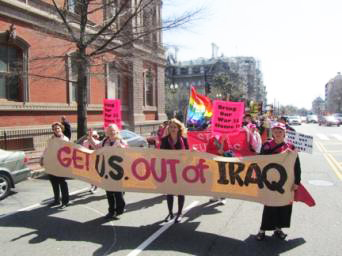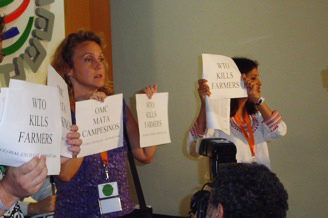
Ask just about anyone about the “99%” these days and, regardless of how they feel about the Occupy movement, they’ll probably acknowledge the increasing concentration of wealth and power that the past few decades have brought. Occupy has successfully propelled issues of inequality and corporate control to mainstream consciousness, here in the belly of the beast, in the nation that has been pivotal to defining the world economic system.
The current popular US dissent over the extreme concentration of wealth and the marginalization of the voices of the majority has long precursors in US social movements. The farmers’ movements of the 1870s, the populist movement of the 1890s, the Industrial Workers of the World (Wobblies) and other militant labor unions from the dawn of the 20th Century through the 1950s, the civil rights and Black, Chicano, and Native nationalist movements from the 1960s on, and many other social movements… all have been rooted in calls for a more equitable division of power and economic resources. Parallel struggles, in many different forms, have occurred throughout the world.
The global justice movement, also known as the anti-globalization movement, exploded around the global South in the 1980s, when new draconian reforms demanded by the World Bank and International Monetary Fund (IMF), as conditions for loans, destroyed national economies and the lives of those within them. The World Trade Organization meeting in Seattle in 1999 and the World Bank and IMF meetings in Washington in 2000, when hundreds of thousands of residents of the US and Europe turned out into the streets to protest the trade and financial regimes, marked something new: active alliance from the global North. Since then, organized populations everywhere have worked in their own countries and transnationally to subvert the rules of the global economy, where the wealthiest citizens, corporations, and counties make the decisions for all of us. The people’s movements have reminded us that economic globalization, which we are told is the only possible economic order, only commenced at the end of World War II, and that we do not have to accept it as it currently exists.
Those who are flooding streets today in Spain, Portugal, and Greece, and the millions who have preceded them around the world, all posit an alternative vision for economies: that they be just, that they provide for all without exploitation, that they place the well-being of human beings and the environment over profit, and that everyone gets to be part of shaping them. They believe that economic relationships should be driven by our desire to nurture each other and our communities, not by the competition and greed often underlying the corporate market. And they have won dramatic victories.
Deborah James has been a leader in the global movement for economic justice for decades. Today she serves as Director of International Programs at the Center for Economic and Policy Research, where she campaigns against the expansion of the World Trade Organization (WTO) and for improved US policy in Latin America. Below she speaks about how international financial institutions hinder countries’ efforts at poverty alleviation, instead prioritizing corporate interests. She also describes citizens’ efforts to oppose the power of these institutions, and tells of the countries that have made strides toward freeing themselves from the economic chains, providing inspiration to us all.
Deborah James | Washington, DC, USA:

In writing the rules for economies, the International Monetary Fund [IMF] and WTO [World Trade Organization] are major proponents of neoliberal ideology. That ideology is based on the theory that slashing government spending, reducing tariffs, privatizing public resources, and promoting corporate investment will result in higher economic growth, and that this will eventually result in a reduction in poverty because a rising tide lifts all boats. This contrasts with more progressive viewpoints that focus on reducing inequality by investing in health care, education, and opportunities for the poor.
The mandate of the IMF is to help countries overcome short-term financial difficulties by giving out loans.[2] However, these loans are only provided if countries restructure their economies. That is, they have to adhere to these neoliberal economic policies, like cutting government spending in areas such as education and health care, to regain what is called “fiscal discipline,” which means not spending more money than you are taking in. The problem is that the result in many countries has actually been a reduction of growth and development – stagnant wages, more unemployment. Thus, while the creditors are bailed out by the IMF, often the borrowing country is unable to repay the loan, resulting in an endless cycle of impoverishment and indebtedness.
Similarly, the World Trade Organization develops and enforces rules for trade and investment. It favors rights for corporations to trade over the rights of governments and peoples to develop healthy and sustainable economies.[3] We know that trade can be an engine for growth if used strategically by a country; but trade can also be a vehicle to boost corporate profits that actually limits the ability of local economies to develop, and pits workers against each other in a race to the bottom.
So the evidence shows that the extreme neoliberal model has actually failed to produce economic growth and has exacerbated inequality. It’s causing the biggest distribution of wealth – away from the majority of people and into the pockets of big corporations – in the history of the modern world. However, no matter what evidence neoliberals are shown to the contrary, they still promote this model because it’s in the interest of the corporations that are driving their agendas.
Fortunately, there’s a lot of questioning of neoliberalism now. Latin America and Asia are two regions that have largely paid off their loans and liberated themselves from the IMF in the last decade or two, and that has had a huge impact. Asia experienced a severe economic crisis in 1997; countries like Malaysia that broke with the IMF and took care of their domestic economy before paying off foreign investors actually did better than the ones that followed the IMF’s economic advice. Since then, much of Asia has decided that they’re never going to be subject to this foreign economic intervention again, and they’ve built up tremendous economic reserves so they don’t ever have to go ask for a bailout. It’s been a very good thing. They’ve had fairly decent economic growth over the last 15 years or so, and lifted millions and millions of people out of poverty.
We’ve seen big victories within our hemisphere as well. One was the defeat of the proposed Free Trade Area of the Americas in the early 2000s. Another example was in 2001 when Argentina broke with the IMF and told them it wasn’t going to pay foreign investors before investing in its own domestic economy. In the last 10 years, Argentina has been one of the fastest growing economies in Latin America and has lifted 10 million
people out of poverty because of that faster growth. Similarly, in spite of the fact that Venezuela has been quite hard hit by the global recession, they’ve lowered their poverty rate by more than half and extreme poverty by even more than that in the last decade. In fact, during the 80’s and 90’s, most of the region experienced economic stagnation under
IMF agreements. But now, most of Latin America has paid off its debts to the IMF, and is no longer under its constraints. The people have elected leftist governments that focus on building relationships among countries in the region, rather than being too dependent on the United States. Now growth is rebounding, unemployment has been reduced, and countries have made great strides in reducing poverty.

Globally we have a very important movement to get outstanding debt to the IMF cancelled, called the Jubilee movement. They’ve achieved important victories for many poor countries by freeing poor nations to be able to use their own resources for their real economic needs instead of paying the IMF. Unfortunately, we don’t actually have a movement focused on challenging the IMF’s fundamental power, and I think we need to create that. It’s not just about debt cancellation, but taking the IMF out of the business of running economies around the world.
And at a time when countries are still suffering from the global crises, and governments are imposing “austerity” instead of spurring development through investment, we need a global movement for fiscal stimulus – for the idea that government funds should be invested where the public will benefit the most, like health care and education and ensuring food security. Unemployment benefits create far more jobs than tax breaks, because those who receive these benefits generally have to spend their money immediately.
Economists know this; when politicians argue in favor of tax cuts to spur growth, they are just arguing in the interests of corporate profit, not reflected in any economic reality. Unfortunately, because many people in progressive movements don’t understand how important growth is to poverty reduction, we often spend more time fighting over specific cuts or programs rather than working together to demand government investments that would benefit the entire economy.
Another key global justice campaign is to stop the expansion of the WTO agreement through what’s called the “Doha Round” of negotiations, and to roll back existing WTO rules that limit governments’ abilities to manage crises. Fortunately there’s a movement focused on this, the Our World Is Not for Sale global network. It’s comprised of organizations from 50 different countries. After nearly a decade of struggle, it looks like we have a chance of stopping the expansion of the WTO again this year – permanently this time. The solution is not to have no global trade rules; we need to have rules disciplining corporate behavior. But we need a new institution run with the purpose of using trade to promote growth, jobs, and sustainable development, not just increasing trade.
To bring it home to the United States, we have a national coalition called the Citizens’ Trade Campaign that’s composed of grassroots movements from across the country that would be affected by trade agreements in a negative way, including farmers’ unions, environmental groups, labor unions, student movements, progressive people of faith, consumer advocacy groups.
As movements for justice, we need to work to bridge the efforts among those challenging the overarching institutions that design the architecture of the global economy, and those working for economic empowerment on the local scale who are grounded in the lived experiences of those affected by the institutions. How can we empower the people who are actually affected by the issues to be the advocates and spokespeople? How can we ensure that those working on economic justice on the local level have access to information so that they can advocate for their interests in the bigger scheme of things? We need to ensure that we don’t just convey the right information, which is key, but also that we connect the bigger picture economic struggles to the problems people experience in their communities, in a way that people can understand and really feel motivated to come together and work to improve people’s lives.
To learn more about Deborah James’ organization, Center for Economic and Policy Research, please see www.cepr.net. Photos courtesy of Deborah James.
1. International Financial Institutions (IFIs) refers to institutions such as the International Monetary Fund, World Trade Organization, World Bank, and regional development banks.
2. The International Monetary Fund (IMF) was established, along with its sister organization the World Bank, as part of the Bretton Woods institutions intended to rebuild the global economy in the aftermath of WWII.
3. The World Trade Organization (WTO) is an international body, established in 1995, that develops and enforces rules for trade and investment. The WTO includes agreements not only on tariffs and subsidies on goods and agriculture, but also services, government procurement, trade facilitation, intellectual property, investment, domestic regulation, and many more non-trade issues.
Inspired? Here are a few suggestions for getting involved!
- Challenge yourself to make conversations about the workings of international financial institutions interesting and useful. Global Exchange’s Global Econ 101 webpage (www.globalexchange.org/resources/econ101) and the International Forum on Globalization (www.ifg.org) can help.
- Get involved with campaigns such as those to halt the expansion of the World Trade Organization (WTO), stop new trade agreements and renegotiate existing ones, end Fast Track, and cancel global debt:
- Public Citizen’s Global Trade Watch, www.citizen.org/trade
- Our World is Not for Sale global campaign, www.ourworldisnotforsale.org
- Citizens’ Trade Campaign, www.citizenstrade.org/ctc
- Democracy Is for People campaign of Public Citizen, www.democracyisforpeople.or
- Jubilee USA, www.jubileeusa.org
- Help build economic justice and power for workers. Learn about and engage in campaigns and organizing efforts through these organizations:
- Jobs with Justice, www.jwj.org
- US Federation of Worker Cooperatives, www.usworker.coop
- United Students against Sweatshops, www.usas.org
- Work for US policy that supports women around the world and their families. Learn how through Women Thrive Worldwide (www.womenthrive.org/index.php?option=com_content&task=view&id=1117&Itemid=196).
